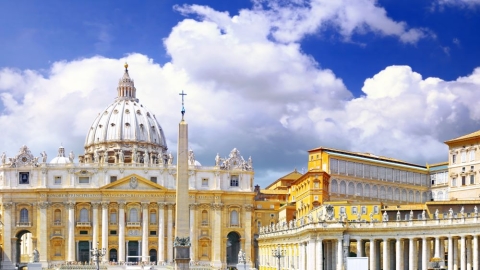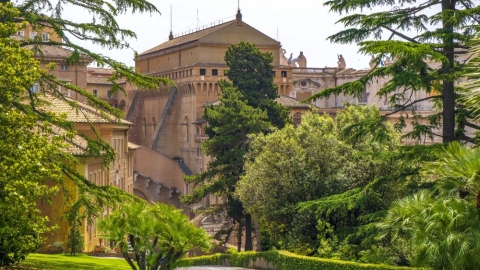Waiting for the Synod on the Amazon: The Encyclical Laudato si’ (2)
The Instrumentum laboris, or working document, of the Synod on the Amazon has not stopped provoking reactions and commentaries. Criticisms have become so impassioned they speak of heresy. But who is responsible for this growing confusion? Pope Francis answered by declaring that the Synod would be the “son of Laudato si’.” The study of this encyclical, published on May 24, 2015, is therefore particularly important. This second article highlights the severe criticism of the pope’s current world.
The present situation is presented as a “world crisis” (no. 137), which for Francis is the heritage “of two centuries…of changes” (no.102) poorly controlled (no. 46). The cause of it is the lack of culture needed to confront it (no. 53), because scientific progress and economic growth have not been accompanied by authentic social and moral progress (no.4). This crisis is manifested in the political, economic, technical, anthropological, and ecological or environmental domains.
A General Political Failure
The doldrums of politics come from the obsession with power (no.198), “a politics concerned with immediate results” (no.178), because “governments are reluctant to upset the public.”
It is also tied to corruption (no.197), but the most profound cause—often denounced in the encyclical—is the submission of politics to economic and financial powers, as well as to technology (nos. 54 and 189). The pope concludes that the current political system is obsolete, “chiefly because the economic and financial sectors, being transnational, tends to prevail over the political” (no.175).
Economic distortion takes a central place in the encyclical. The financiers are obsessed with profit (no.198). The lie of the infinite availability of the goods of the planet (no.106) leads to the idea of unlimited growth which allows the economic powers to justify the current system, where the search for financial revenue dominates (no.56). The pope is especially aiming at the lure of maximum gain, the distortion of the economy (no.195) based on the immediacy already noted (no.32). He finally accuses “the market [which] tends to promote extreme consumerism in an effort to sell its products” (no.203).
The stranglehold of technology tends to make technoscience a paradigm conditioning people’s lives and the functioning of society (no.107). This “culture” is the fundamental problem because it is a supreme explanation of the world (no.106). It tends to a “globalization of the technocratic paradigm” (Chapter 3, Title II), which commands the economy to sideline anything unrelated to its immediate interests (no.54), and by this means it directs policy itself (ibid.).
The crisis is still at the individual level, in the modern anthropocentrism that has put technology above reality, through technocracy (no.115). It has deeply distorted human life (no.122). It is at the origin of individualism. The subject, left to himself and his desire for domination, falls into “a compulsive consumerism,” a subjective reflection of the “techno-economic paradigm” (no. 203). It engenders relativism, which places the human being at the center of the world, and gives top priority to his circumstantial interests—all the rest becomes relative (no. 122).
The encyclical also addresses the ultimate causes of this multifaceted crisis. The pope emphasizes the major role of skepticism. “There are no indisputable truths” (no. 6), which implies that “human freedom is limitless.” This leads to the negation of purpose (no.123), supported by the technocratic paradigm, because if “empirical science provides a complete explanation of life,… reason’s ability to grasp the ultimate meaning and purpose of things” disappears (no.199). Hence a profound distortion of the relationship to reality because in this context, “it becomes almost impossible to accept the limits imposed by reality” (no.204). The excess is reached when man “declares independence from reality” (no.117).
This finding has been variously analyzed and judged. It has often been perceived as a heavy-handed criticism of capitalism and economic liberalism, and as an attempt to overcome a simplistic left-right division. However, it was generally well received by left-leaning circles, who saw an approval of their way of thinking.
Independently of these external judgments, the encyclical’s point of view remains purely natural. Admittedly, there are references in the text to Scripture, to spirituality, to theology, but they are mainly intended for one part of the readers; they are only in small amounts that do not affect the essentials. The pontifical document essentially puts forward a socio-political analysis that completes a philosophical observation. The theological dimension is almost absent, sign of a serious fault and a latent defect.
An Analysis of Socio-Ecological Inspiration
When the popes, up to Pius XII, have deplored the evolution of the modern world, especially for two centuries, they expressly aimed at liberalism—in the philosophical and theological sense of freedom without restraint—resulting from the revolution, and they also aimed at triumphant rationalism, socialism, and communism. Basically, according to the teachings of the popes since Pius VI, the revolution is the source of contemporary evils, because it rejected God and Christ.
This is the essential reason that is no longer remembered. Francis, following his predecessors, notably Paul VI, regrets that material progress is not accompanied by genuine social and moral progress. No doubt, but how can an “authentic moral progress” come about if Christ no longer rules over human societies? “Unless the Lord build the house, they labor in vain that build it” (Ps.126:1).
Moreover, the criticism of the economic system in Laudato si’, even if it has a certain relevance, finally boils down to pointing out men’s greed: producers, sellers, or consumers. It forgets to give us the reason, which is theological: the wounds of original sin, especially the immoderate desire for wealth. The analysis remains simply sociological.
The Shadow of Liberation Theology
They will object that the second chapter of the encyclical deals with “The Gospel of Creation.” Its purpose is to “show how faith convictions can offer Christians…ample motivation to care for nature and for the most vulnerable of their brothers and sisters...so that we can better recognize the ecological commitments which stem from our convictions” (no. 64). It is in fact to mobilize Catholics so as to put them under the banner of integral ecology, even if it means using theology.
Thus Francis once more takes up a known notion of theology: the universal destination of goods. The Pope relies on this doctrine to assert that “Christian tradition has never recognized the right to private property as absolute or inviolable, and has stressed the social purpose of all forms of private property,” which is true (no. 93). But he immediately adds, quoting the Bishops of Paraguay, that “every campesino [peasant] has a natural right to possess a reasonable allotment of land” (no. 94). This affirmation contradicts the previous issue and shows Francis’ “socialist” inspiration, which again takes up the idiosyncrasies of liberation theology.
Green Scientism as a new Gospel?
The Laudato si’ encyclical is certainly right to recognize and denounce the omnipresence and omnipotence of science which has become the new paradigm of the modern world. But this approach is weakened by the position taken by the whole encyclical, which builds itself around another paradigm, that of environmentalism. This amounts to falling more or less into the error that the pontifical document intends to criticize. From now on it is green scientism that becomes the dominant thought.
Finally, the philosophical analysis—more relevant since it denounces the absence of purpose—cruelly lacks an openness to theology. But the truth is one. It is Christ who proclaimed: “I am the Way, the Truth, and the Life” (Jn 14:6). Not to mention Him as the One in Whom everything must be restored is to remain at the level of relativism that they claim to be fighting. Because of its shortcomings and its errors of perspective, the encyclical struggles to offer real solutions to the crisis of modern civilization
(Source : FSSPX - FSSPX.Actualités - 02/10/2019)





